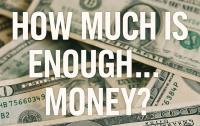How Much is Enough…Money? Part Four of a Series

“You can never be too rich or too thin.” This quote has been attributed to the Duchess of Windsor, Wallis Simpson, but also claimed by several other people. Most regular people will never be in the position to ponder whether we are “too rich,” so the question then becomes how much money is enough – to live the life you want, to retire on time or early, to fund children’s education, to protect your family, the list goes on. There certainly are a lot of areas where having money is not just a good thing, it is essential.
In planning, we address those financial goals that should be within reach of most people. And it might surprise you to know that having upwards of $1 million in annual income is not a guarantee that you will have enough money once you are not earning that salary. Conversely, I’ve seen plenty of people making low six figures be able to retire and live comfortably throughout their life expectancies. It is all about the balance.
And then there is the question of whether money can buy happiness. A 2010 study by Daniel Kahneman and Angus Deaton is frequently cited as determining that $75,000 is the threshold beyond which additional income does not increase well-being. However, more recent studies have expanded on those results and shifted the perspective a bit. Kahneman and another researcher, Matthew Killingsworth, paired up to do an adversarial collaboration that showed overall happiness does increase with income over $100,000 without plateaus, but only with happy people. Unhappy people will experience increases in well-being up to $100,000 and then plateau.1 In other words, if you are unhappy, then earning or having more money isn’t going to increase your feelings of well-being. So, you can be very wealthy and be very unhappy.
Beyond the personal sense of satisfaction that more money can provide, there is the socio-economic issue of whether a person can be too rich. Most people can agree that with certain professions comes an amount of wealth that appropriately reflects the education, training, drive, and dedication associated with it. Then there are those who have outsized wealth seemingly built off other’s efforts and/or extraordinary luck and timing. In an article titled, “Can You Be Too Rich?”, Umair Haque argues that the super wealthy are not economic because they “hoard vast amounts of capital, starving the economy of investment, opportunity.”2 These are people who Haque defines as being able to buy the finest of every good in the economy ten times over. He also points out that the super-rich will never have to rely on public goods the way others, including the rich, do. But most important is his premise that, “when societies allow the rich to grow into the super-rich, they are limiting what societies can achieve.”2
Very few people will be super-rich to the point of never having to ponder the question of how much is enough from a lifestyle perspective. The rest of us need to start with personal evaluation and analysis. But there is always that question of happiness as it pertains to how we live and spend the money we make or accumulate. No one can project that in a mathematical sense. And if you are lucky to have enough money to do what you want in life without having to be anxious about every dollar spent then the challenge becomes what to do with the excess.
Meet Kristan L. Anderson, CEBS®, CFP® »
"How Much is Enough" Series:
- "How Much Is Enough? Part One of a Series"
April 29, 2024 By Kristan L. Anderson, CEBS®, CFP® » - "How Much Is Enough...Stuff? Part Two of a Series"
September 09, 2024 By Kristan L. Anderson, CEBS®, CFP® » - "How Much is Enough...Space? Part Three of a Series"
February 28, 2025 By Kristan L. Anderson, CEBS®, CFP® »
Sources:
1 https://penntoday.upenn.edu/news/does-more-money-correlate-greater-happiness-Penn-Princeton-research
2 https://hbr.org/2014/05/can-you-be-too-rich
IMPORTANT DISCLOSURES
West Financial Services, Inc. (“WFS”) offers investment advisory services and is registered with the U.S. Securities and Exchange Commission (“SEC”). SEC registration does not constitute an endorsement of the firm by the SEC nor does it indicate that the firm has attained a particular level of skill or ability. You should carefully read and review all information provided by WFS, including Form ADV Part 1A, Part 2A brochure and all supplements, and Form CRS.
This information is intended to be educational in nature, and not as a recommendation of any particular strategy, approach, product or concept. These materials are not intended as any form of substitute for individualized investment advice. The discussion is general in nature, and therefore not intended to recommend or endorse any asset class, security, or technical aspect of any security for the purpose of allowing a reader to use the approach on their own.
Certain information contained herein was derived from third party sources as indicated. While the information presented herein is believed to be reliable, no representation or warranty is made concerning the accuracy of any information presented. WFS has not and will not independently verify this information. Where such sources include opinions and projections, such opinions and projections should be ascribed only to the applicable third-party source and not to WFS.

